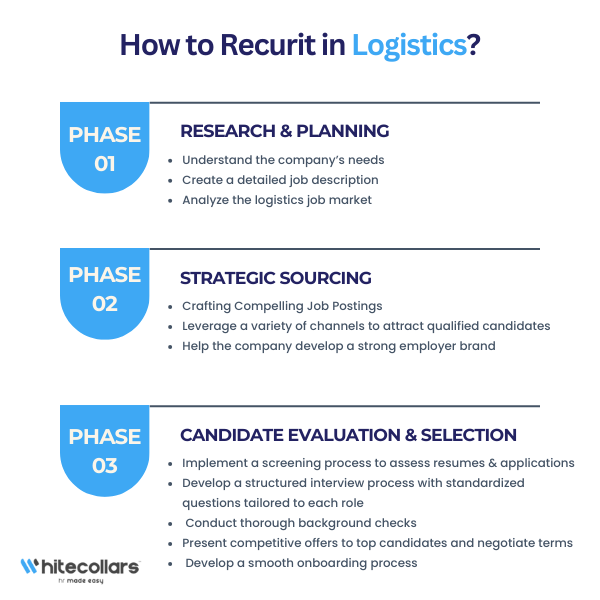
The engine of global commerce is running hot, and the demand for skilled logistics professionals has never been higher. But with growth comes a hidden challenge: finding the talent to keep the wheels turning.
This comprehensive guide dives deep into the world of logistics recruitment, exploring why it matters, the challenges you’ll face, and the winning strategies to secure the perfect fit for your open positions.
Whether you’re a seasoned logistics professional or just starting in the industry, understanding the recruitment landscape is crucial. This guide will equip you with the knowledge to navigate the complexities of finding top talent in a competitive market.
What is Logistics Recruitment?
Logistics recruitment is the specialized process of finding and hiring qualified candidates for positions within the logistics industry. This encompasses a wide range of roles, from warehouse associates and truck drivers to supply chain analysts and logistics managers.
Here’s a breakdown of what logistics recruitment entails:
- Understanding Industry Needs: Recruiters need to stay current on trends and challenges within the logistics sector to identify the specific skills and experience companies are looking for.
- Targeting the Right Talent Pool: Logistics recruiters utilize various channels to source candidates, including online job boards, industry associations, and professional networks.
- Assessing Skills and Experience: The recruitment process involves evaluating candidates’ qualifications through interviews, assessments, and reference checks to ensure they possess the necessary skills and experience for the logistics role.
- Selling the Opportunity: Recruiters must effectively communicate the value proposition of the role and the company to attract top talent in a competitive market.
Overall, logistics recruitment is crucial in ensuring logistics companies have the skilled workforce they need to operate efficiently and meet customer demands.
Is Logistics in High Demand?
Over the last 10 years, the number of employees in the warehousing & storage industry has almost tripled in the US. In 2013, the US Bureau of Labor Statistics reported 707,000 employees. In 2023, that number went up to 1,933,000.
So the answer is yes, logistics jobs are currently in high demand. Here’s a breakdown of why:
- E-commerce Growth: The surge in online shopping has led to a significant increase in the need for efficient logistics operations to deliver products to customers.
- Globalized Supply Chains: Complex global supply chains require skilled professionals to manage the flow of goods across borders.
- Labor Shortage: The logistics industry faces a shortage of qualified workers, driving up demand for skilled candidates.
This high demand is reflected in statistics:
- The BLS projects a 28% growth rate for logistician jobs over the next decade, much faster than the average for all occupations [US Bureau of Labor Statistics, Occupational Outlook Handbook, Logisticians].
- The logistics industry can also experience high employee turnover, creating a constant need for new hires.
5 Common Challenges in Logistics Recruitment
The logistics industry is a powerhouse, but finding the right talent to keep it humming can be a challenge. Logistics recruiters face a unique set of hurdles, here are some of the most common:
- Skill Shortage: The demand for qualified logistics professionals is high, but the talent pool sometimes needs to catch up. This can make it difficult to find candidates with the specific skills and experience needed for open positions, especially for specialized roles.
- Competition is Fierce: Logistics companies aren’t the only ones vying for top talent. Warehouse operators, transportation firms, and other players in the industry are all competing for the same pool of qualified candidates. This drives up competition and makes it even harder to attract top performers.
- Lack of Candidate Awareness: Many potential candidates simply aren’t aware of the exciting and diverse career opportunities available in logistics. The industry may not always have the best reputation for attracting young talent.
- Data Dilemma: Logistics recruitment often lacks access to comprehensive and reliable data on job market trends, salary benchmarks, and candidate preferences. This can make it difficult for recruiters to make informed decisions about their sourcing strategies and compensation packages.
- High Turnover: The logistics industry can experience high employee turnover rates due to factors like long hours, demanding schedules, and physically strenuous work. This creates a constant need for new hires, adding to the workload of recruiters.
These challenges can be daunting, but there are strategies logistics recruiters can employ to overcome them. We’ll explore these strategies in the next section of the guide!
How to Recruit in Logistics in 3 Phases?
If you’re in a role to hire the perfect fit in logistics, here’s the logistics recruiting process in the UK:

Phase 1: Research. and Planning
- Understand the Company’s Needs: Begin by meeting with key stakeholders, including hiring managers, executives, and HR personnel. This will help you understand the company’s culture, strategic goals, and specific needs for each open position.
- Job Analysis and Profiling: Work collaboratively with hiring managers to create detailed job descriptions that outline the required skills, experience, and qualifications for each role.
- Competitive Landscape Research: Analyze the logistics job market, including salary trends, competitor offerings, and types of talent currently available.
Phase 2: Strategic Sourcing and Candidate Attraction
- Crafting Compelling Job Postings: Develop targeted job descriptions that showcase the company’s unique value proposition and the benefits of working in logistics. Utilize keywords relevant to the industry and specific roles.
- Multi-Channel Sourcing: Cast a wide net to attract qualified candidates. Leverage a variety of channels, including online job boards, professional networking sites (like LinkedIn), industry associations, and company career pages.
- Building Relationships: Engage with industry leaders, attend relevant events and conferences, and cultivate relationships with educational institutions that produce logistics professionals.
- Employer Branding: Help the company develop a strong employer brand that resonates with potential candidates. Highlight the company culture, career growth opportunities, and unique employee benefits.
Phase 3: Candidate Evaluation and Selection
- Screening and Assessment: Implement a screening process to assess resumes and applications based on pre-defined criteria. Utilize skills assessments or testing relevant to the position, when appropriate.
- Structured Interviews: Develop a structured interview process with standardized questions tailored to each role. This ensures fairness and consistency in evaluating candidates.
- Background Checks and References: Conduct thorough background checks and reference checks on shortlisted candidates.
- Offer Negotiation and Onboarding: Present competitive offers to top candidates and negotiate terms. Develop a smooth onboarding process to integrate new hires effectively into the company culture and team.
The logistics industry is booming, but with that growth comes fierce competition for skilled talent. High turnover rates are another hurdle companies face.
While the previous steps establish a strong foundation for your recruitment strategy, attracting top performers in this dynamic environment can be complex.
Whitecollars: Where Logistics Recruitment Meets Expertise
Whitecollars Logistics recruitment company understands this struggle. We’re not just another agency; we’re your strategic partner in building a high-performing logistics team. Here’s how Whitecollars can help you navigate the competitive landscape and find the perfect fit for your open positions:
Targeted Talent Pool:
We don’t waste time with generic searches. We take the time to understand your specific needs and build a targeted talent pool of qualified logistics professionals. This ensures you reach the right candidates with the right skillsets for your unique requirements.
Data-Driven Recruitment:
We leverage cutting-edge technology and data-driven practices to streamline the recruitment process. This allows us to identify top performers efficiently and optimize our sourcing strategies for maximum impact.
Competitive Compensation and Benefits:
Attracting top talent requires a compelling offer. We help you analyze salary benchmarks and craft competitive compensation packages that stand out in the crowded logistics job market.
Expert Interview Processes:
Our team of logistics specialists builds customized interview processes, such as group interviews, and questions specifically tailored to the demands of your industry. This ensures we’re assessing candidates based on the skills and experience that truly matter for your success.
Cultural Fit Assessment:
Finding the right fit goes beyond skills and experience. Whitecollars uses proven techniques to measure cultural fit and ensure new hires will thrive within your company environment, fostering a cohesive and productive team.
Seamless Onboarding:
A strong recruitment journey doesn’t end with an offer letter. We can guide you through implementing effective onboarding processes that ensure new hires feel welcome, informed, and prepared to excel in their roles from day one.
By partnering with Whitecollars, you gain access to a team of logistics recruitment experts who understand the industry’s complexities and your specific needs.
We’ll work closely with you to build a strong recruitment strategy that attracts top talent, reduces turnover, and fuels your logistics operations for the future.
Whitecollars Recruitment for All Logistics Roles:
Whitecollars, a logistics recruitment company, can be your one-stop shop for finding top talent across all levels of your organization in the UK. Here’s a breakdown of the roles we can help you fill:
Executive Roles:
We specialize in executive search to identify and attract high-caliber candidates for leadership positions such as Chief Logistics Officers (CLOs), Supply Chain Directors, Transportation Directors, and Warehouse Management Directors.
Managerial Roles:
Our expertise extends to filling critical management roles like Logistics Managers, Warehouse Managers, Transportation Managers, Distribution Center Managers, and Fleet Managers.
Operational Roles:
The backbone of your day-to-day operations is filled with skilled professionals, and Whitecollars can help you find qualified candidates for positions including Warehouse Associates, Order Pickers and Packers, Inventory Control Specialists, Transportation Specialists, Freight Forwarders, and Logistics Analysts.
We understand the unique needs of each level within logistics. By leveraging our targeted talent pools, industry expertise, and data-driven recruitment practices, we can connect you with the perfect fit for every open position – from strategic leaders to the hands-on operational workforce that keeps your logistics running smoothly.
Ready to Build a High-Performing Logistics Team?
Don’t let the competitive landscape hold you back. Partner with Whitecollars recruitment firm and gain access to a team of logistics recruitment specialists dedicated to finding the perfect talent for your needs.
Contact us today for a free consultation!
FAQs:
What is a Logistics Recruiter Job Description?
A logistics recruiter is a specialized talent acquisition professional who focuses on identifying and attracting qualified candidates for positions within the logistics industry. This can encompass a wide range of roles, from warehouse associates and truck drivers to supply chain analysts and logistics managers.
What are the 5 Stages of the Recruitment Process?
- Job Analysis & Planning: Define open roles, required skills, and ideal candidate profiles.
- Sourcing & Candidate Attraction: Utilize various channels (online job boards, industry events) to reach qualified candidates.
- Candidate Screening & Selection: Review resumes, conduct interviews, and assess skills and cultural fit.
- Offer & Negotiation: Present a competitive offer package and negotiate terms with the top candidate.
- Onboarding: Welcome new hires, integrate them into the team, and provide necessary training.
How to Improve Process Efficiency in Logistics Recruitment?
- Tech it Up: Use Applicant Tracking Systems (ATS) to streamline tasks and track candidates.
- Target Your Search: Focus on channels where logistics professionals hang out (industry sites, online communities).
- Standardize Interviews: Develop a consistent interview format for a fair evaluation.
- Data Drives Decisions: Track metrics (time-to-fill, cost-per-hire) to optimize your approach.
- Build Relationships: Network with industry pros and schools to create a talent pipeline.
- Brand Yourself: Highlight your company culture and career opportunities to attract top talent.


